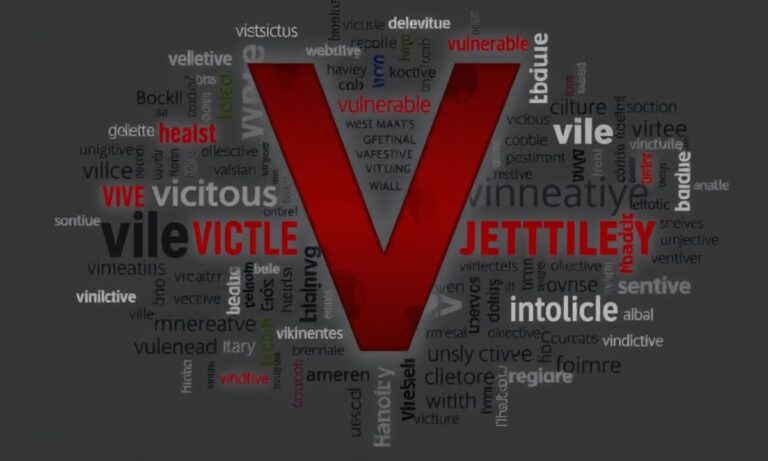Expanding your vocabulary with negative V words can significantly enhance your linguistic arsenal, enabling more precise and powerful communication in both written and spoken forms.
These vicious, vindictive, and venomous terms provide the perfect vocabulary tools for expressing disapproval, describing challenging situations, or crafting compelling narratives with depth and nuance.
Whether you’re a student improving academic writing, a professional seeking more impactful communication, or a creative writer developing character descriptions, mastering negative V vocabulary offers invaluable language development opportunities while strengthening your overall expressive capabilities.
READ MORE: https://fashiongravity.co.uk/negative-words-that-start-with-y-in-2025/
Vicious, Vile, Vain
The letter V introduces a remarkable collection of negative descriptors that carry substantial linguistic power in the English language vocabulary.
These words, including vicious, vile, and vain, create immediate impact through their distinctive phonetics – the V sound naturally produces a forceful verbal expression that emphasizes disapproval or criticism.
Throughout history, these negative V words have maintained their potency, appearing consistently in literature, philosophy, and everyday discourse to identify problematic character traits and situations.
What makes these terms particularly valuable for writers and speakers is their specificity; rather than relying on generic negative language, V-words like vindictive or volatile capture precise meanings with remarkable efficiency.
This vocabulary precision allows for more nuanced communication, whether in academic writing, creative storytelling, or professional correspondence.
Understanding the subtle differences between terms like vapid, vulgar, and venomous enhances your ability to select exactly the right negative descriptor for any circumstance, thereby improving your overall linguistic resources and communication skills significantly.
Negative V Words That Describe People Or Things
Negative V words offer remarkably precise tools for describing people or things with unfavorable characteristics, allowing writers and speakers to convey specific critiques with linguistic precision.
Words like “vacant” perfectly capture emptiness – whether referring to an unoccupied property or someone’s unfocused expression that suggests an absence of comprehension or attention.
“Vindictive” describes individuals consumed by vengeance to an unreasonable degree, unwilling to consider alternatives to retribution, making it an essential descriptor for characters in both fiction and real life who cannot move beyond perceived wrongs.
The term “virulent” effectively conveys extreme hostility or bitterness, aptly characterizing inflammatory actions, statements, or attitudes that spread like infectious agents within communities or discourse.
For vocabulary enhancement in professional contexts, words such as “verbose” (excessively wordy) and “vacuous” (lacking substance) provide sophisticated alternatives to simpler negative terms, elevating writing and speech with greater specificity.
What makes these negative descriptors particularly valuable is their ability to pinpoint precise character flaws – “vainglorious” captures excessive pride and boastfulness, while “volatile” effectively describes unpredictable emotional states or unstable situations.
Understanding these nuanced negative V words significantly improves your ability to craft accurate descriptions, develop compelling characters in creative writing, and articulate precise criticisms in academic or professional settings, ultimately enhancing your overall communication skills and expressive writing capabilities.
- Vain
- Vindictive
- Venomous
- Vicious
- Volatile
- Vulgar
- Vapid
- Vexing
- Violent
- Vengeful
- Vacuous
- Villainous
- Venal
- Verbose
- Voracious
- Vitriolic
- Virulent
- Vile
- Vulnerable
- Voyeuristic
- Vacant
- Vanquished
- Vague
- Vampiric
- Vassal
- Vigilant
- Voided
- Vague
- Vaporous
- Viral
- Vulnerable
- Venturesome
- Vacillating
- Vociferous
- Vindictive
- Vampish
- Vestigial
- Vicarious
- Vainglorious
- Violated
- Visceral
- Vanished
- Vitiating
- Verminous
- Villified
- Victimized
- Vandalizing
- Vertiginous
- Venerable
- Voluptuous
- Vexatious
- Vapourish
- Vehement
- Void
- Vulnerable
Negative Adverbs That Begin With The Letter V
Negative adverbs beginning with V function as powerful linguistic modifiers that enhance verbs, adjectives, and other adverbs with unfavorable connotations, significantly strengthening descriptive language in both written and verbal expression.
These adverbs typically feature the characteristic “-ly” ending and provide crucial information about how, when, where, or to what extent an action occurs, injecting precision into negative descriptions.
“Vexingly,” for instance, perfectly captures the irritating nature of actions or situations that provoke annoyance – such as authorities moving “vexingly slowly” during an emergency, creating a vivid image of frustration through this single adverbial choice.
The distinctive negative V adverb “vindictively” transforms any action into one motivated by revenge or spite, immediately establishing the actor’s questionable intentions and emotional state without requiring extensive explanation.
What makes these adverbial forms particularly valuable for language development is their efficiency; “vapidly” instantly communicates that something was done in a dull, uninspiring manner, while “venomously” conveys intense hostility in a single word, demonstrating how adverbs can dramatically intensify negative connotations.
For writers seeking vocabulary building opportunities, mastering less common negative V adverbs like “vicariously,” “vociferously,” or “venially” provides sophisticated alternatives that add variety and precision to descriptions, elevating writing quality through more nuanced word choices.
Understanding and incorporating these negative adverbs into your linguistic resources creates more engaging, precise communication that captures subtle shades of meaning, ultimately enhancing both academic writing and creative expression through thoughtful vocabulary enhancement.
- Viciously
- Vindictively
- Venomously
- Violently
- Vulgarly
- Vapidly
- Vexingly
- Vengefully
- Virulently
- Vituperatively
- Vacuously
- Vitriolically
- Vainly
- Vehemently
- Vengefully
- Villainously
- Venally
- Verbosely
- Voraciously
- Vilely
- Vulnerably
- Voyeuristically
- Vacantly
- Vaguely
- Viciously
- Vituperatively
- Voluptuously
- Vacillatingly
- Vociferously
- Vaingloriously
- Viscerally
- Verminously
- Vexatiously
- Vehemently
- Voidly
- Viperously
- Violably
- Vaporously
- Vanishingly
- Vauntingly
- Vitiatingly
- Vapidly
- Vulnerably
- Venially
- Vicariously
- Vainglorious
- Vexedly
- Vigilantly
- Vindictively
- Virally
- Visibly (in a negative context)
- Venturously
- Vertiginously
- Vainly
- Vividly (when describing negative things)
- Variably (in an unreliable sense)
- Vitally (in a threatening way)
- Villainously
- Violatingly
- Voraciously
- Vacillatingly
- Vassally
- Vengefully
- Venally
- Vitriolically
Negative Adjectives That Start With V
Negative adjectives beginning with V serve as essential descriptive tools that directly modify nouns with unfavorable characteristics, creating immediate impact in both written and spoken communication.
These powerful descriptors provide specific negative connotations that general terms cannot achieve – “virulent” precisely captures extreme hostility or bitterness that spreads like an infection, while “vapid” perfectly describes something lacking liveliness, interest, or meaningful content.
The precision of negative V adjectives makes them invaluable for character development; describing someone as “vindictive” immediately establishes their consuming desire for revenge, while “volatile” efficiently communicates unpredictable emotional states without requiring extensive explanation.
What makes these adjectives particularly valuable for vocabulary expansion is their ability to replace vague negative descriptors with precise terminology – instead of calling someone “bad,” terms like “villainous,” “vicious,” or “vile” provide specific information about the nature and degree of their negative qualities.
For professional and academic writing enhancement, sophisticated negative V adjectives like “venal” (corrupt, especially regarding bribery), “vitriolic” (caustic, severely critical), and “virulent” (extremely hostile) offer alternatives that demonstrate linguistic flexibility and precision.
Understanding the subtle differences between these negative descriptors – recognizing when something is better described as “vulgar” versus “vile,” or “vacuous” versus “vapid” – significantly improves your ability to communicate effectively in contexts ranging from creative writing to formal criticism, ultimately strengthening your overall command of expressive language and descriptive terminology.
- Vile
- Vicious
- Vindictive
- Venomous
- Violent
- Vulgar
- Vapid
- Vexing
- Volatile
- Vengeful
- Vacuous
- Villainous
- Venal
- Verbose
- Vitriolic
- Virulent
- Vulnerable
- Voyeuristic
- Vacant
- Vague
- Vampiric
- Vanquished
- Vassal
- Voided
- Vaporous
- Venturesome
- Vacillating
- Vociferous
- Vainglorious
- Violated
- Visceral
- Verminous
- Villified
- Victimized
- Vertiginous
- Vexatious
- Vehement
- Void
- Vandalizing
- Vitiating
- Venial
- Venereal
- Vapid
- Volatile
- Villainous
- Vanishing
- Voracious
- Vestigial
- Viscious
- Vulnerabl
Sad And Depressing Words That Start With V
Sad and depressing V words provide crucial linguistic tools for expressing emotional distress, psychological struggles, and difficult life circumstances with precision and authenticity.
These terms help articulate the complex spectrum of negative emotions that individuals experience during challenging times, making them essential for both personal expression and professional contexts like counseling or mental health services.
The word “victim,” for instance, identifies someone who has suffered harm, injury, or loss – acknowledging this status can be a vital first step in processing trauma and seeking appropriate support services from victims’ assistance organizations or mental health professionals.
Words like “void,” “vacant,” and “vanished” effectively capture the emptiness and absence that often characterize profound grief or loss, providing linguistic validation for these complex emotional experiences that might otherwise remain difficult to articulate.
What makes these sad V words particularly valuable for communication skills development is their ability to create shared understanding; when someone describes feeling “vulnerable,” “violated,” or experiencing “vertigo” during emotional distress, these specific terms bridge communication gaps and facilitate empathy between individuals.
For writers seeking vocabulary enhancement, mastering the subtle distinctions between terms like “void” (complete emptiness) versus “vacant” (unfilled space) allows for more nuanced emotional descriptions in both creative and academic writing.
Understanding and appropriately using these sad and depressing V words not only improves personal expression during difficult times but also enhances your ability to develop authentic emotional content in creative writing, academic analyses of psychological states, and professional communications related to mental wellbeing or emotional support.
- Void
- Vacant
- Vulnerable
- Vanquished
- Victim
- Vacuous
- Vanished
- Violated
- Vexed
- Vain
- Vulnerable
- Vapid
- Void
- Vulnerable
- Victimized
- Voiceless
- Veiled
- Vague
- Vacant-eyed
- Vaporized
- Vitiated
- Void
- Vicious
- Virulent
- Violent
- Vindictive
- Virulent
- Venomous
- Vanity
- Vacant-hearted
- Void-filled
- Vicarious
- Volatile
- Vulnerable
- Vanishing
- Vague
- Victim
- Vicious
- Victimization
- Vendetta
- Vengeance
- Volatile
- Vortex
- Volition
- Voided
- Vulturelike
- Vulnerable
- Vanquished
- Vacant
- Vindictiveness
- Vacuity
- Visceral
- Void
- Vicious
- Venom
- Violence
- Vulgar
- Vagabond
- Villainous
- Volatile
- Violated
- Vulnerability
- Vampiric
- Valediction
- Vanity
Obscure Words That Start With V
Obscure V words represent fascinating linguistic treasures that, despite their rarity in everyday communication, offer remarkable precision and historical depth for those seeking vocabulary expansion beyond common terminology.
These uncommon terms often preserve specific concepts or phenomena that mainstream language has simplified, providing unique expressive opportunities for writers, speakers, and language enthusiasts.
The term “vaticide,” for example, specifically refers to the murder of a prophet – a concept that would require several words to explain without this precise term, demonstrating how obscure vocabulary can achieve remarkable linguistic efficiency while connecting to historical contexts like Biblical narratives.
Similarly, “venenate” (to poison, especially with animal venom) offers etymological connections to more familiar terms like “venom,” revealing fascinating word relationships that enhance understanding of language development and evolution.
What makes these obscure V words particularly valuable for writing enhancement is their ability to capture highly specific concepts – “verbomania” (an excessive passion for words) and “vernalagnia” (romantic feelings brought on by spring) describe precise phenomena that would otherwise require lengthy explanations.
For academic writing and creative expression, incorporating carefully selected obscure terms like “vespertilionize” (to transform into a bat) or “vaticinate” (to prophesy) can add distinctive flair, historical depth, and precise meaning that elevates language beyond ordinary expression.
Understanding these unusual terms not only expands your personal vocabulary but also connects you to linguistic history and specialized knowledge domains, ultimately enriching your linguistic resources while providing distinctive word choices for both creative and formal communication contexts.
- Velleity
- Volutation
- Vaticination
- Vilipend
- Vacivity
- Velitation
- Vespine
- Valetudinary
- Veliform
- Vivisepulture
- Ventripotent
- Vespertine
- Vulpecular
- Vituperate
- Velleicate
- Vatic
- Venville
- Vulpicide
- Vesperal
- Virgulate
- Vellicate
- Verecund
- Voluptuary
- Vicinal
- Valetudinarian
- Vivific
- Vesicant
- Volitation
- Vulgus
- Vicissitude
- Venefic
- Vaporium
- Vexillology
- Vespertilian
- Videlicet
- Vexillum
- Vernation
- Volant
- Verriculate
- Vertiginous
- Vulturine
- Villeggiatura
- Vinous
- Viscid
- Vagitus
- Vulpine
- Vitiate
- Viridescent
- Velutinous
- Voussoir
- Vigesimal
- Vermiculate
- Ventriloquize
- Versicolor
- Verisimilar
- Vorticose
- Verdigris
- Visceral
- Valetudinarianism
- Virescent
- Vespiary
- Vellicate
- Vade mecum
- Vicissitudinous
- Vulturous
Unusual Words That Start With V
Unusual V words represent extraordinary linguistic specimens that, while uncommon in everyday discourse, offer remarkable specificity and historical connections for language enthusiasts seeking vocabulary expansion beyond conventional terminology.
These distinctive terms often preserve highly specialized concepts that mainstream language has generalized, providing unique expressive opportunities for writers, researchers, and those fascinated by linguistic development.
The term “verbicide,” for instance, specifically identifies the intentional misuse or corruption of a word (like in puns or deliberate wordplay) – a concept that would require multiple words to explain without this precise term, demonstrating the linguistic efficiency unusual vocabulary can achieve while adding depth to discussions about language evolution.
Similarly, “velleity” (a wish or inclination not strong enough to lead to action) captures a subtle psychological state that most people recognize but struggle to articulate without this specific term, showing how unusual words can name familiar phenomena with remarkable precision.
What makes these unusual V words particularly valuable for writing enhancement is their ability to distinguish your work through distinctive word choices – terms like “venatic” (relating to hunting), “ventifact” (a stone shaped by wind erosion), or “veliferous” (carrying sails) bring specialized knowledge and precise imagery to both creative and academic writing.
For language development purposes, understanding the origins and relationships between unusual terms – recognizing how “venation” (arrangement of veins) connects to biological structures or how “velocipede” relates to early bicycle history – creates deeper linguistic comprehension and appreciation.
Incorporating these unusual V words thoughtfully into your communication not only demonstrates sophisticated vocabulary but also connects your expression to rich etymological traditions and specialized knowledge domains, ultimately providing unique verbal tools for precise and memorable communication.
- Velleity
- Volutation
- Vaticination
- Vilipend
- Vacivity
- Velitation
- Vespine
- Valetudinary
- Veliform
- Vivisepulture
- Ventripotent
- Vespertine
- Vulpecular
- Vituperate
- Velleicate
- Vatic
- Venville
- Vulpicide
- Vesperal
- Virgulate
- Vellicate
- Verecund
- Voluptuary
- Vicinal
- Valetudinarian
- Vivific
- Vesicant
- Volitation
- Vulgus
- Vicissitude
- Venefic
- Vaporium
- Vexillology
- Vespertilian
- Videlicet
- Vexillum
- Vernation
- Volant
- Verriculate
- Vertiginous
- Vulturine
- Villeggiatura
- Vinous
- Viscid
- Vagitus
- Vulpine
- Vitiate
- Viridescent
- Velutinous
- Voussoir
- Vigesimal
- Vermiculate
- Ventriloquize
- Versicolor
- Verisimilar
- Vorticose
- Verdigris
- Visceral
- Valetudinarianism
- Virescent
- Vespiary
- Vamoose
- Vade mecum
- Vicissitudinous
- Vulturous
- Vexatious
- Voracious
- Viviparous
- Vermicular
- Vasopressin
- Vociferant
- Vitrophyre
- Vitrescence
- Verbigeration
- Vomitory
- Vesication
- Velutinous
- Ventrilocution
- Vilipendency
- Vaccimulgence
FAQ’s
What are the disadvantages of using negative words that start with “V” in communication?
Excessive use of negative V words can create an overly critical tone, potentially damaging relationships, fostering pessimism, and hindering constructive problem-solving efforts in both personal and professional contexts.
How can I replace negative V words with more constructive alternatives in professional settings?
Replace vindictive language with solution-focused terminology, substitute vague criticisms with specific improvement suggestions, transform volatile expressions into stable communication patterns, exchange verbosity for concision, and replace vicious criticism with constructive feedback.
What are the most common negative V words used in everyday English conversation?
The most frequently used negative V words in daily conversation include vague, vain, violent, vulgar, vicious, vulnerable, vengeful, vacant, and volatile, appearing regularly in both casual interactions and more formal discussions.
How can mastering negative V vocabulary improve my writing skills?
Understanding precise negative V terminology enhances descriptive accuracy, creates more nuanced character development, builds emotional authenticity, improves critical analysis capabilities, and expands your overall expressive range for more engaging and sophisticated writing.
Is it possible to break the habit of using negative V words in my everyday speech?
Yes, through conscious language monitoring, positive alternative vocabulary development, mindfulness practices during conversations, gradual habit replacement techniques, and consistent practice of constructive communication patterns.
Conclusion
Mastering negative words that begin with V significantly enhances your linguistic versatility, allowing for more precise expression across various communication contexts from academic writing to creative storytelling.
These vocabulary building tools – from common terms like vicious and vain to obscure options like vaticide and verbicide – provide essential descriptive language that captures specific negative qualities with remarkable efficiency.
Understanding these negative expressions improves your overall communication skills while expanding your expressive capabilities beyond generic terminology.
For writers, speakers, educators, and language enthusiasts alike, this extensive negative V-words dictionary serves as an invaluable resource for vocabulary enhancement and language development.
Whether you’re crafting compelling narratives, developing precise criticisms, or simply expanding your linguistic knowledge, these negative V words represent powerful tools for more effective and nuanced communication.

I’m Irfan, an experienced SEO content and SEO specialist with 2 years of expertise, currently contributing to Al Jazeera News Website.





